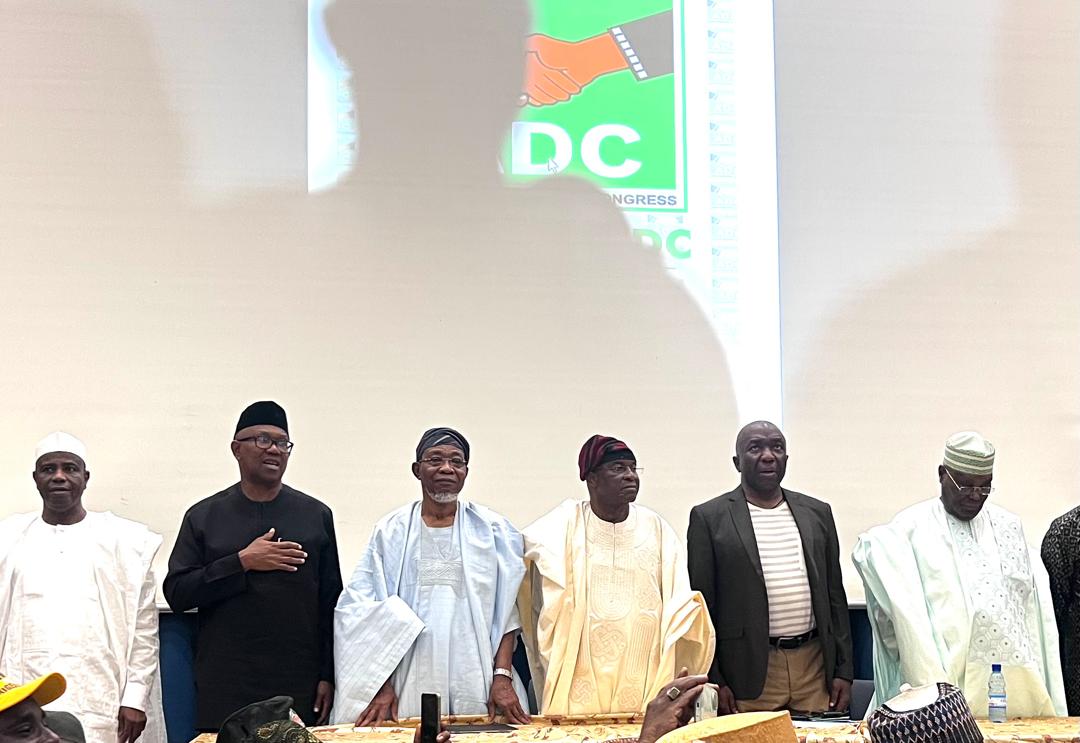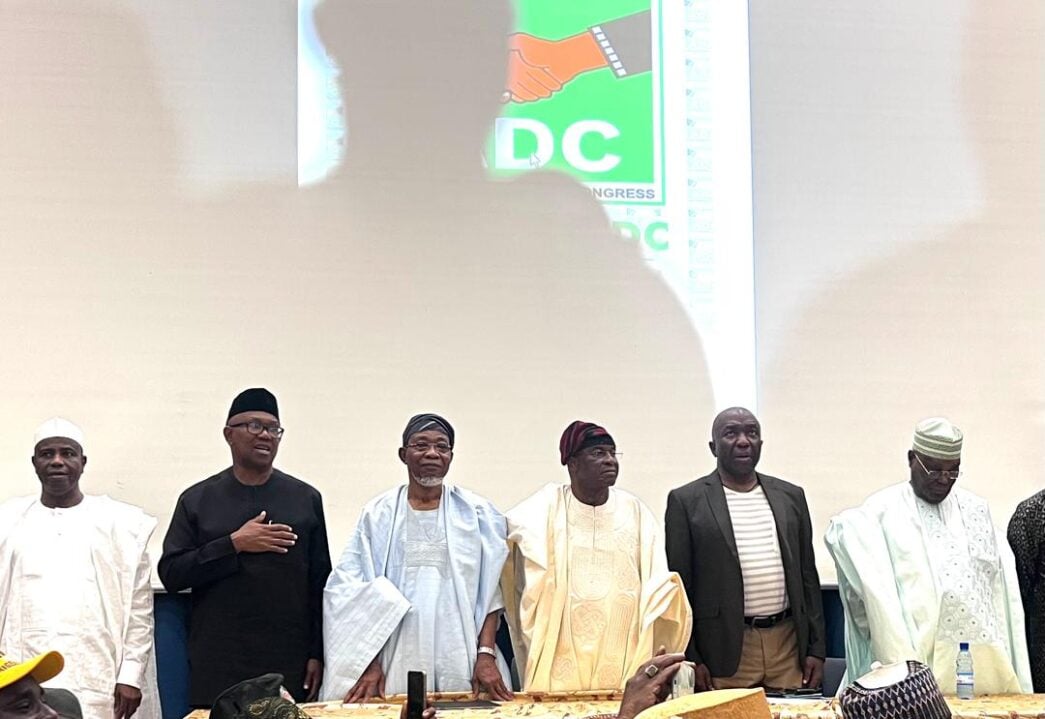BY SANI DANAUDI MOHAMMED
The African Democratic Congress (ADC) has emerged as a significant player in Nigeria’s 2027 elections, with prominent figures joining forces to challenge the ruling All Progressives Congress (APC). Former Vice-President Atiku Abubakar, a strong contender for the presidency, has thrown his weight behind the ADC. Other notable figures include Aminu Waziri Tambuwal, former governor of Sokoto state; Abubakar Malami, SAN, former attorney-general of the federation; and Nasir el-Rufai, former governor of Kaduna state.
These high-profile signings have raised questions about the potential takeover of the ADC by the elite. Critics argue that the party’s original ideology may be compromised, while supporters believe these figures can bring much-needed experience and resources to the party. Other key members include Rotimi Amaechi, former minister of transportation; David Mark, former senate president; and Rauf Aregbesola, former governor of Osun state, who will likely influence the direction of voters in 2027.
The ADC’s leadership structure includes David Mark as interim national chairman and Rauf Aregbesola as interim national secretary. The party’s manifesto prioritises national unity, security, and economic reforms, offering a credible alternative to President Tinubu’s administration. With Atiku Abubakar and Peter Obi, former Labour Party presidential candidate, at the helm, the ADC is poised to challenge the APC in 2027.
Advertisement
The party’s ability to deliver on its promises will depend on its internal dynamics and the commitment of its leaders to the party’s ideology. While some members have expressed concerns about the takeover, others see it as an opportunity for growth and renewal. As the 2027 elections approach, the ADC’s performance will be closely watched by Nigerians and political analysts alike.
The prospect of a one-party system in Nigeria raises fundamental questions about the country’s democratic future. As politicians and citizens weigh the potential benefits and drawbacks, one thing is certain: the decision would have far-reaching consequences. A single-party dominance could either foster stability and efficiency or suppress dissent and limit representation, leaving Nigerians to ponder the implications of such a system on their democracy and development.
Multi-party democracy is crucial for developing countries like Nigeria. It allows for diverse representation, promotes accountability, and provides citizens with choices. Countries like South Africa, Ghana, and Kenya have successfully implemented multi-party systems, fostering competition and innovation. In Nigeria, this system has enabled various voices to be heard, promoting national unity and inclusivity.
Advertisement
The recent defections from the Peoples Democratic Party (PDP) to the ruling All Progressives Congress (APC) have sparked debate about Nigeria’s democracy. Senator Douye Diri and Governor Peter Mbah’s defections follow those of the governors of Delta and Akwa Ibom states. Critics argue that defections undermine party loyalty and stability, while proponents see it as a sign of a healthy democracy.
The opposition African Democratic Congress (ADC) believes the defections validate their warning that President Bola Tinubu is determined to create a one-party state. The ADC described the move as a “gang-up” against Nigerians, stating that the governors abandoned their people to join the ruling party. This development has raised concerns about the future of Nigeria’s democracy and the potential for one-party dominance.
The long-term implications of these defections on Nigeria’s democracy remain uncertain. However, one thing is clear: politicians must prioritise citizens’ needs and welfare. The success of Nigeria’s democracy depends on leaders who promote stability, accountability, and good governance. By fostering transparency and inclusivity, Nigeria can build a robust and resilient democracy that truly serves its citizens and promotes national development.
Nigeria’s geopolitical zones are currently dominated by the All Progressives Congress (APC), which controls a significant number of states across the country. In the south-south region, the APC has a stronghold with four out of six states, while the PDP only controls Rivers State, and Bayelsa has no clear party affiliation. The APC’s dominance is also evident in the south-east, where they control three out of five states.
Advertisement
The APC’s stronghold extends to other regions, including the south-west, north-central, north-east, and north-west. The party controls a total of 20 states, while the PDP has six states, mostly in the north-west, north-east, and south-west. Other parties, such as the Labour Party (LP), All Progressives Grand Alliance (APGA), and New Nigeria Peoples Party (NNPP), have a presence in a few states, highlighting the complexities of Nigeria’s party politics.
The recent defections from PDP to APC are attributed to PDP’s internal crisis and lack of direction, rather than President Tinubu’s influence. Former Ekiti State Governor Ayo Fayose notes that the PDP’s leadership issues have led to its decline. The defections are a result of PDP’s inability to provide a clear alternative leadership, pushing members to seek better opportunities in the APC.
China is often cited as an example of a one-party state that has achieved rapid economic growth and development. However, critics argue that this comes at the cost of individual freedoms and human rights. In contrast, Nigeria’s situation is different, with concerns about the ruling party’s intentions and the opposition’s weakness.
The opposition’s failure to provide a strong alternative narrative and its internal divisions have contributed to its decline. Rather than blaming the ruling APC, the opposition should reflect on its own shortcomings and strategise for the future. Strengthening internal democracy, building grassroots support, and offering credible alternatives could help revitalise the opposition.
Advertisement
The 2027 elections will indeed be a crucial test of Nigeria’s democratic process. The recent defections from PDP to APC have sparked intense debate, with some attributing it to PDP’s internal crisis and lack of direction. As politicians jockey for position, the electorate’s expectations are high, and the outcome will likely shape the country’s future trajectory.
The Independent National Electoral Commission (INEC) must ensure a credible and transparent process, addressing issues like electoral violence, vote buying, and result manipulation. Nigerians demand a leadership that prioritises their welfare, security, and economic development. The 2027 elections offer an opportunity for citizens to hold leaders accountable and shape the nation’s future.
Advertisement
Nigerians shouldn’t be overly concerned about looming defections. Peter Obi’s 2023 presidential campaign showed that candidates can transcend traditional party strongholds. Despite lacking establishment backing, Obi won 12 states, demonstrating voters’ willingness to support candidates based on merit.
The 2023 elections also saw prominent politicians lose their states. Despite being strong APC figures, some governors and senators failed to deliver their states to the party’s presidential candidate. This highlights the growing independence of Nigerian voters, who prioritise performance and good governance over party loyalty.
Advertisement
Voters are increasingly driving change, and their decisions can’t be predetermined by politicians’ defections. With a strong voter base and credible leadership, alternative parties can still emerge victorious. The focus should be on voters’ priorities and the quality of leadership rather than party defections.
The looming defections from the opposition PDP to the ruling APC have sparked intense debate, with some attributing it to the PDP’s internal crisis and lack of direction. Meanwhile, the African Democratic Congress (ADC) is positioning itself as a potential alternative, attracting prominent figures and supporters. As the 2027 elections approach, the dynamics of party politics will likely shift further.
Advertisement
Nigerian voters must remain vigilant and focused on their priorities, seeing beyond the political gladiators and their party affiliations. The recent example of Peter Obi’s presidential campaign shows that voters can drive change and transcend traditional party strongholds. By holding leaders accountable and demanding good governance, Nigerians can shape their own destiny.
Ultimately, the success of Nigeria’s democracy depends on the active participation of its citizens. As the country navigates the complexities of party defections and emerging political formations, voters must stay informed, engaged, and committed to their values. By doing so, they can create a brighter future for themselves and future generations.
Danaudi writes from Bauchi and can be contacted via [email protected]
Views expressed by contributors are strictly personal and not of TheCable.



